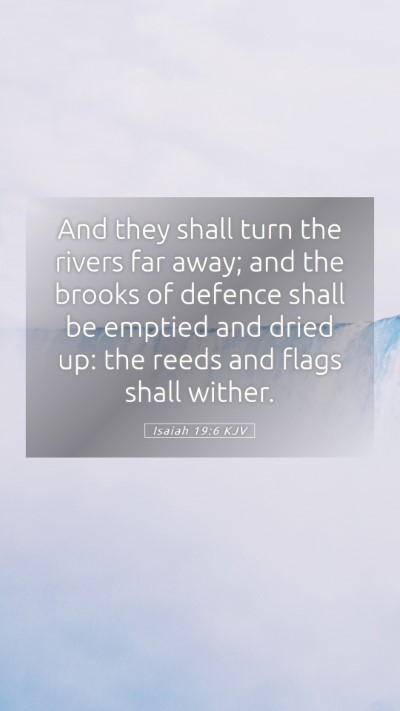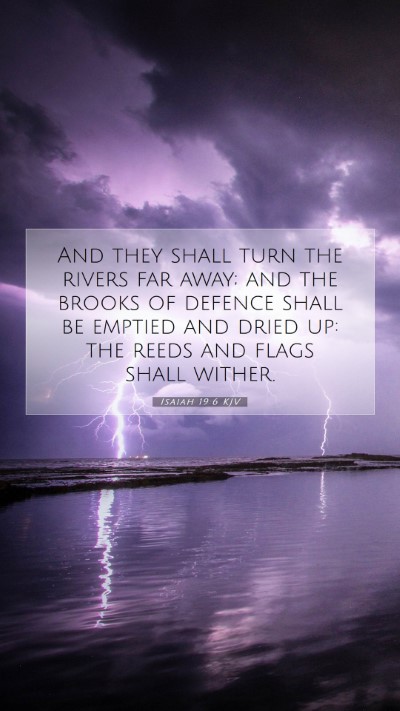Understanding Isaiah 19:6
In this analysis derived from public domain commentaries, we explore the meaning and significance of Isaiah 19:6. This verse is rich with implications about divine judgment and the consequences of straying from God's ways. Isaiah, a significant prophet in the Old Testament, conveys messages concerning both Israel and its neighboring nations. The examination will draw from insights provided by Matthew Henry, Albert Barnes, and Adam Clarke to enhance your Bible study insights.
Verse Content
"And they shall be dissolved as the flax of the field; we shall be taken away. And so every one shall remain in his own place." - Isaiah 19:6
Verse Explanation
This verse, situated within a prophecy concerning Egypt, is a depiction of overwhelming destruction. Here, Isaiah employs a vivid metaphor comparing the dissolution of the inhabitants and structures of Egypt to that of flax when it is subjected to fire—essentially emphasizing the sudden and devastating nature of God’s judgment.
Matthew Henry Commentary
- Judgment and Destruction: Henry articulates that the fate of Egypt, once a significant power, illustrates a divinely ordained downfall. The reference to "dissolved" signifies a total disintegration of their societal fabric.
- Symbolism of Flax: The choice of flax, which is known for its fragility, serves to underline the transitory nature of worldly strength and fortifications in opposition to divine will.
- Universal Impact: Henry observes that the devastation reached all people in their respective places, symbolizing that divine judgment knows no boundaries.
Albert Barnes Commentary
- Destruction's Reach: Barnes emphasizes that the dissolution described extends beyond physical destruction. He suggests a spiritual and moral decay accompanying the calamities faced by Egypt.
- Divine Sovereignty: There is an emphasis on God's sovereignty in directing such events. The metaphor of flax highlights how God can easily dismantle nations like one would a mere piece of cloth.
- Spiritual Implications: Barnes points out that this verse serves as a warning to nations. It reflects the need for humility before God, illustrating the peril of rejecting His ways.
Adam Clarke Commentary
- Historical Context: Clarke provides a backdrop of Egypt’s socio-political climate, explaining how their reliance on human strength led to their downfall.
- Analysis of "Dissolved": He elaborates on the term "dissolved," asserting that this implies a loss of both strength and character, a complete moral bankruptcy.
- God's Intent for Nations: Clarke interprets this passage as an indication of God's intent to bring nations to acknowledgment of His power and presence, as well as repentance.
Application of Isaiah 19:6
When applying this verse to modern life, it serves as a reminder of the fragility of human endeavors when not aligned with divine purposes. It calls for a reflection on national and individual reliance on God rather than mere human strength.
Related Cross References
- Jeremiah 44:30: A reference to divine judgment upon Egypt.
- Ezekiel 30:4: The prophesied destruction of Egypt under God's decree.
- Hosea 8:7: A reminder that sowing seeds of sin leads to harvests of consequence.
Conclusion
In conclusion, Isaiah 19:6 serves not solely as a historical account or prophetic warning, but also functions as a vital lesson on the nature of God's sovereignty and the importance of aligning our lives with His principles. For those seeking Bible verse meanings or interpretations, the insights derived from traditional commentaries provide depth and clarity to biblical texts.
Further Study Recommendations
Consider engaging in online Bible study using various tools and resources. Deepen your understanding through guided studies focusing on:
- Historical context of prophetic literature.
- Interpreting metaphorical language in Scripture.
- Applications of Old Testament prophesies in today's world.


